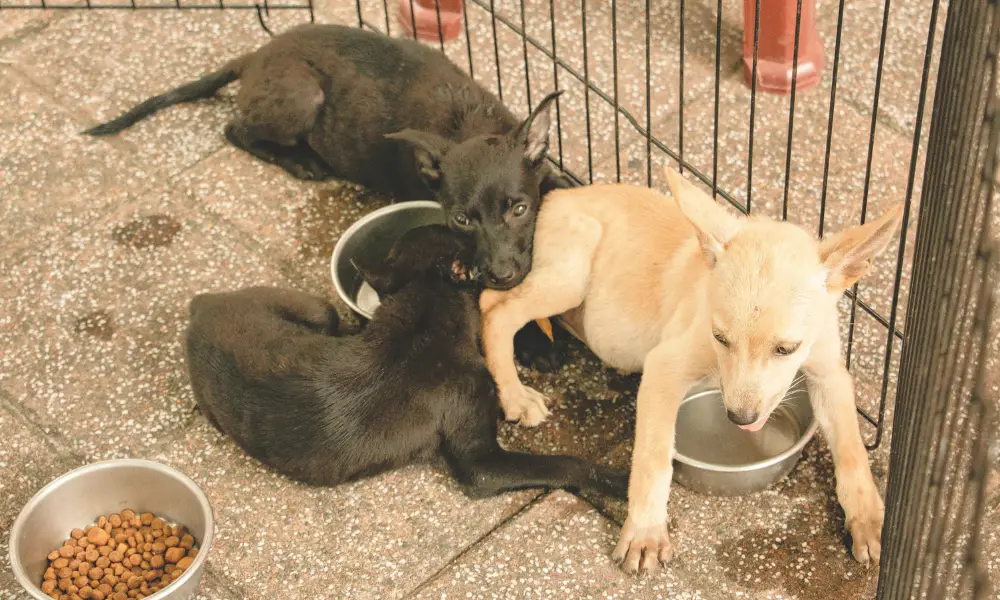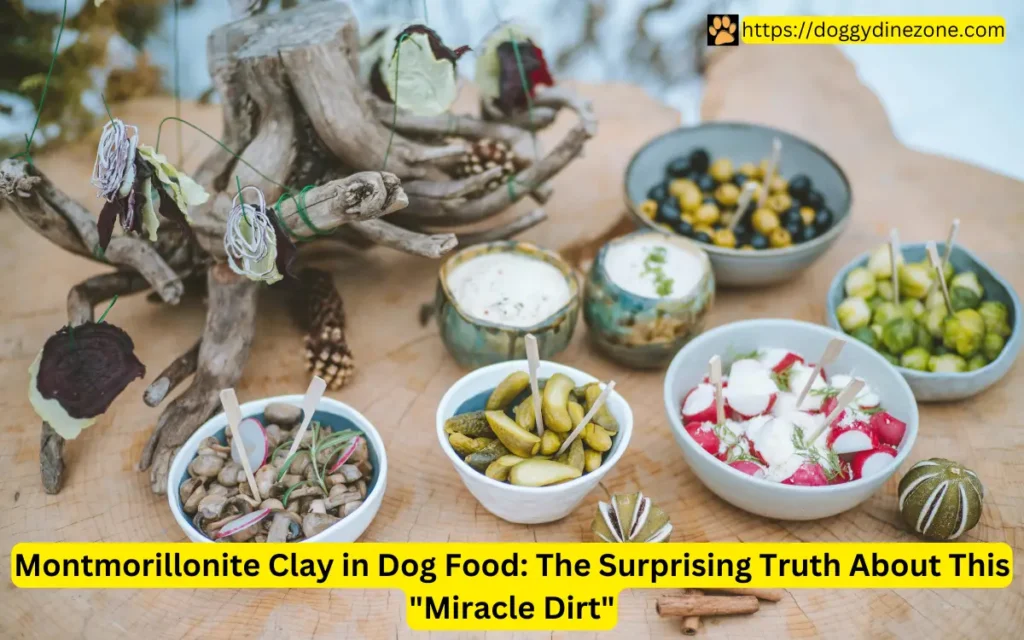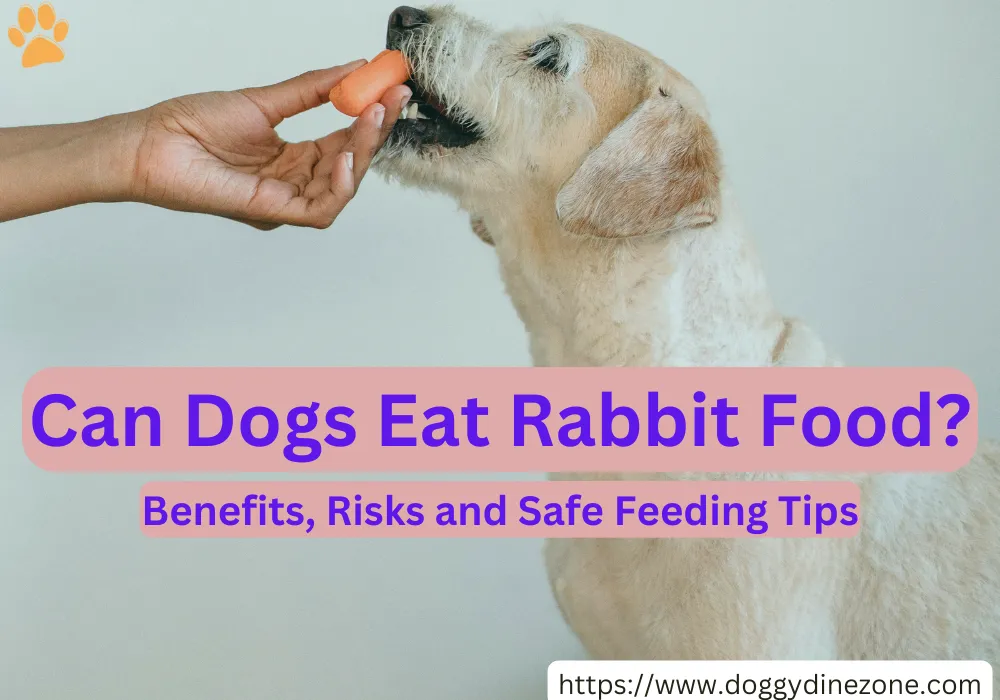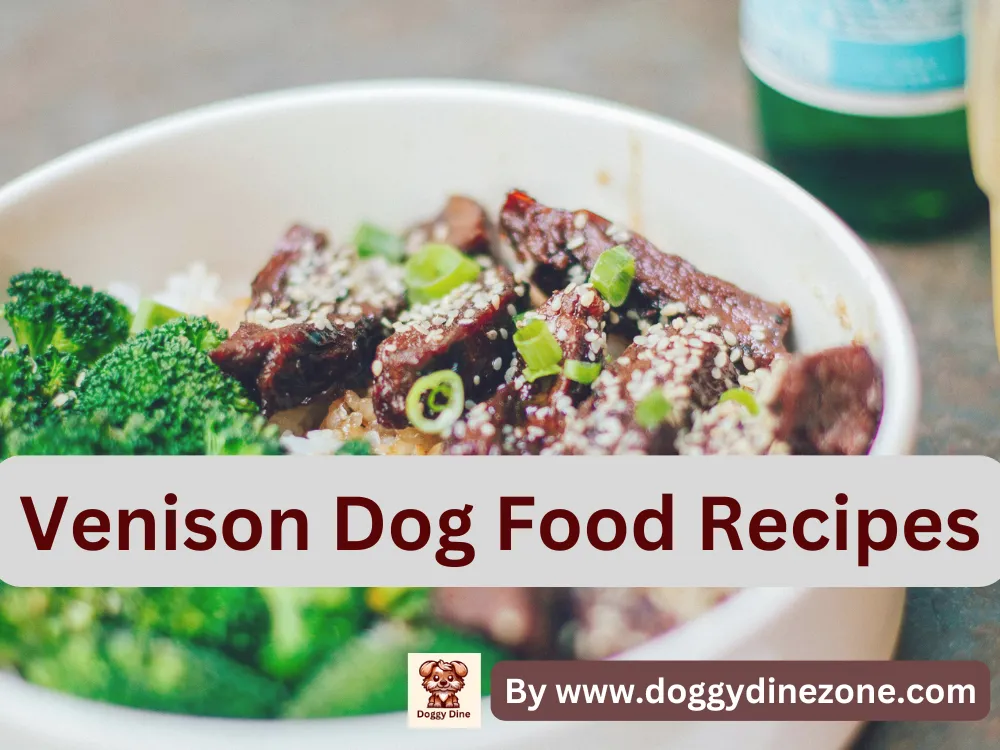You might have seen montmorillonite clay in dog food and thought, “What is this stuff?” It’s weird, like dirt, but don’t worry! This unique clay is suitable for your dog. It helps with tummy troubles and becomes a shiny coat and healthy skin. Many big brands use it in dog food because it works, and science says it’s safe! I will tell the hidden truth about how this clay helps your dog’s health.
- Also Read: Symptoms of Storage Mite Allergy in Dogs
What Is Montmorillonite Clay in Dog Food?
Montmorillonite clay is not regular dirt from the backyard. It’s a unique clay made by volcanic ash in Montmorillon, France. This clay has almost 67 minerals, like calcium, magnesium, and iron; they are suitable for tummy problems if you add them to dog food. But a thing might be in your mind: is clay bad for dogs? You will have to be careful they get the right minerals to help remove bad stuff in their body.
Here’s why nutritional supplements are a great friend for your dog’s health:
- Toxin Buster: It works like a magnet to catch bad things like pesticides, mold toxins (like aflatoxins), and heavy metals. Your dog’s body can fight bad things.
- Gut Guardian: The clay swells in your dog’s tummy. It also helps trap harmful bacteria like E. coli and Salmonella. This is perfect for dogs with tummy troubles!
- Mineral Boost: It gives essential things they might be missing in their food and helps them stay strong and healthy.
- Nature’s Helper: Animals like parrots and chimpanzees eat clay in the wild to help their tummies. Even humans have used it for thousands of years for better digestion!
Did you know? Parrots and chimps eat clay in nature to help their tummies. Humans have used it for thousands of years to support their digestion!
Is Montmorillonite Clay Safe in Dog Food?
A&M University experts have found it suitable for dogs. You don’t need to worry because it’s carefully tested and proven safe.

It’s toxins-free, cleaned, and tested. It’s also FDA-approved; the FDA checked and said it’s safe for pets. The dogs that eat food with it experience 34% fewer tummy problems like diarrhea, and the minerals help their healthy coat. Low-quality clay can be harmful or arsenic. So, always choose food-grade montmorillonite clay or USDA-approved products, and read the label carefully!
5 Paw-some Benefits of Montmorillonite Clay
Bye-bye, Tummy Troubles!
- Does your dog have a sore tummy or messy poop? Stool firmness can help!
- Firms Up Poop: It helps stop diarrhea by soaking up extra water in the belly.
- Balances Gut Bacteria: It removes nasty bugs and leaves space for good ones.
- Repairs the Gut: It helps make the tummy stronger, especially for dogs with upset stomachs.
Detox Powerhouse
- Intestinal flora is good at cleaning the lousy stuff!
- It traps toxins like pesticides, heavy metals, and radiation particles.
Healthy Skin and Coat
- The clay minerals help the skin and health.
- It can reduce itching and hot spots that soften their fur.
Stronger Immunity
- The unique minerals, like zinc and selenium, help to strengthen the body and fight sickness.
- Some studies can help fight tricky bugs like MRSA.
Better Nutrient Mineral absorption
- It helps slow down digestion so your dog’s body can take in more vitamins and good stuff from their food.
- This is important for puppies and older dogs who need extra help with pet nutrition.
Montmorillonite Clay in Raw Dog Food: A Perfect Match
Raw food is healthy for your dog; Sometimes it contains harmful bacteria like Salmonella. It helps in several ways with the prevention formula:
It acts as a natural additive and helps soak up moisture. It also stops harmful bacteria from growing in the raw food. It detoxifies raw meat by trapping harmful substances. It reacts like a bodyguard for your dog when you consume raw food. Calcium added in it may be missing in raw food.
Pro tip: Brands like Primal Pet Foods use montmorillonite in raw, freeze-dried foods to improve digestive support and gastrointestinal health.
Montmorillonite Clay in Dog Food Side Effects

A question arises in your mind: can dogs eat clay? And why do dogs eat clay? It is excellent for your dog, but sometimes it might not work as expected. Most dogs do well with it, but here are a few things to watch for:
If your dog doesn’t drink enough water, they might get constipation and hard poop. You can give them less and add some tasty broth to their food. Sometimes, this clay can interfere with some medications, like antibiotics. It is safe to give any medicine two hours before or after feeding.
Lastly, avoid low-quality clays, like bentonite or cosmetic clay, as they might contain harmful substances. You can choose a good, food-grade option for your dog’s safety.
- Also Read: Foods to Avoid in Dog Bland Diet Recipes
Montmorillonite Clay in Pet Food vs. Bentonite: Which is Safer?
Bentonite clay is another alternative clay used in pet food. It is considered safer and more potent due to the following reasons:
| Feature | Montmorillonite | Bentonite |
|---|---|---|
| Mineral Content | 67+ minerals | 50-60 minerals |
| Purity | Often food-grade | Often industrial-grade |
| Toxin Binding | Binds 95%+ toxins | Binds ~80% toxins |
Montmorillonite is the clear winner for safety and effectiveness, but bentonite can be a budget alternative if it’s food-grade.
Why Do Dogs Eat Dirt? (And When to Worry)
There are a few reasons why is montmorillonite clay bad for dogs. Dogs eat dirt because they need minerals, calcium, and iron. Clay helps them feel better about their tummy when they are sick or nauseous. Some dogs also eat dirt out of boredom when they don’t have enough to do.
Dirt can harm your dog because it contains germs and chemicals. If your dog starts eating dirt, you can try to give clay or talk to your vet for safe and healthy options.
DIY Alert: Don’t Make This Mistake!
It is a risky choice to treat regularly with clay. It might be easy. Here’s why you can avoid:
- Toxic Additives: Homemade clay dough recipe can hurt your dog.
- Choking Hazards: Some clay doughs are thick and small, Which causes harm.
- Wrong Type of Clay: Not all clays are safe for pets. Some cause sickness.
You can use clay-infused foods or vet-approved supplements. You can choose safe and store-bought options instead of DIY recipes!
Top 3 Clay-Infused Dog Foods (US Brands)
- Nature’s Logic: They use montmorillonite as a natural ingredient and stop food from clumping.
- Primal Pet Foods: Primal adds clay to their raw, freeze-dried food to help with tummy problems.
- The Honest Kitchen: Honest Includes clay in their dried food to help detox and stay clean.
You can find these products at any pet store or order them online!
Conclusion
Montmorillonite clay in dog food is an excellent choice for your pet’s health. It helps to clean toxins, supports digestion, and provides essential minerals. Many dog owners choose soil-derived ingredients for their pet’s health. If you want healthier food, this should be at the top of your list of natural options!
FAQs
1. What is montmorillonite clay in dog food?
Montmorillonite clay is a natural ingredient. It is used in dog food to improve digestion, support detoxification, and provide essential minerals for your pet’s health.
2. Is it safe for dogs?
This safe ingredient can enhance your dog’s digestive system and well-being.
3. What happens when dogs eat clay?
It absorbs extra water in your dog’s gut, reduces diarrhea, and supports healthy bacteria growth. It leads to better digestion.
4. Can this ingredient help with food allergies?
It can help reduce inflammation in sensitive stomachs and support digestion for dogs. It is also helpful with food-related issues or allergies.
5. How can I add it to my dog’s diet?
Find good dog food brands that include this ingredient, or ask your vet about supplements; this method will naturally support your pet’s digestion.
About the Author
I’m James Leo, a canine nutrition expert and pet wellness advocate with a passion for helping dog owners make informed, science-backed decisions about their pets’ health. With years of experience in dog food formulation, breed-specific diets, and veterinary care, I specialize in creating research-based guides and tools that improve the lives of dogs and their families.
At DoggyDineZone.com, I’ve played a key role in developing accurate dog dosage calculators, ensuring that pet owners can safely administer medications and supplements tailored to their dog’s unique needs. My work is backed by collaborations with licensed veterinarians and canine nutritionists, blending practical experience with the latest scientific research.
I believe that every dog deserves a healthy, balanced diet, and I’m dedicated to simplifying complex nutrition science into clear, actionable advice. Whether you’re looking for homemade dog food recipes, breed-specific meal plans, or expert guidance on pet supplements, my goal is to provide reliable and easy-to-follow resources that empower dog owners.
I stay updated with the latest veterinary and pet nutrition research by engaging with industry leaders and participating in ongoing education. My approach is simple: help pet owners make confident, well-informed choices for their furry companions.
🔹 Medical Disclaimer: The content I provide on DoggyDineZone.com is for informational purposes only and should not replace professional veterinary advice. Always consult a licensed veterinarian regarding your pet’s health and care.
Through my work, I aim to be a trusted voice in canine nutrition and pet care, helping dog owners give their pets the best possible life.





Pingback: Tomato Pomace in Dog Food: Dangers or Healthy Choice?